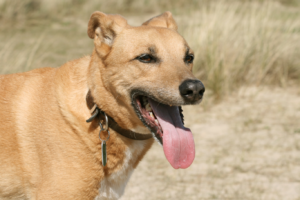Unsure if your pup has seasonal allergies?
Dogs have different allergy symptoms than humans, making it difficult to identify seasonal allergies in dogs. So, today, we’re going over the most common symptoms of seasonal allergies in dogs so that you can identify and treat your pup’s allergies. Keep reading to learn more about treating seasonal allergies at home and when to take your dog to a veterinarian.
- Common Symptoms of Seasonal Allergies
- How to Prevent Allergic Reactions
- How to Treat Seasonal Allergies at Home
- What to Give a Dog with Seasonal Allergies
- When to See a Veterinarian
Can Dogs Have Seasonal Allergies?
Yes! Many owners don’t realize that dogs are just as susceptible to seasonal allergies as we are. Spring and summer are a prime time of year for seasonal allergies to hit with everything from pollen to grass to the increased risk of mold during warmer months affecting our dogs.
Allergies are miserable for anybody, and nothing is worse than watching your favorite furry friend suffer from them. Unlike humans, our dogs are much more prone to itchiness or flaky coats when they suffer from allergies.
Unfortunately, there’s not much we can do to prevent seasonal allergies. However, we can change their lifestyle to help them cope more effectively with their seasonal allergies.
Common Symptoms of Seasonal Allergies in Dogs
Before you look into how to treat dog allergies, it’s important that you identify what common symptoms of seasonal allergies dogs experience. Unlike humans, dogs tend to suffer from more skin-related problems, like itchiness and flaky or irritated skin. Watch out for common symptoms like:
- Unusual and frequent scratching – Seasonal allergies can cause many skin discomfort, particularly increased parts of their body such as their ears, tail, and toes.
- Itchy, watery eyes – Like humans, this is a common allergy symptom in dogs.
- Red or irritated skin – Watch out for irritated skin, especially in areas of their body that may be rubbing against the ground or grass, like their belly.
- Sneezing – Sneezing results from a disrupted respiratory system from inhaling irritants like pollen.
- Discharge from their nose – This is one way that dogs’ immune systems attempt to defend them from the allergens they’ve been exposed to.
- Serious reactions – Your dog may try to scratch or bite their skin for relief, making them susceptible to bacterial infections.
If your dog shows more extreme reactions, like vomiting diarrhea, hives or swelling, we strongly recommend reaching out to your veterinarian.
How to Prevent Dog Allergies
Less Time Outside
Your dog may not be as pleased with this option, but keeping your dog indoors more during peak allergy season is a great way to limit their exposure to allergens.
Make this more fun for your dog by coming up with creative ways to keep them engaged indoors, such as playing games, giving them special attention throughout the day, and helping them release extra energy through indoor exercises.
When you take your dog outside, make sure to wipe them down with a damp cloth to prevent them from bringing more pollen and allergens indoors. Pay special attention to cleaning their feet. This will help them to avoid getting allergens into their eyes, nose, and mouth when they scratch.
Clean Bedding
When they’re not playing, dogs certainly love their naps! Help your dog deal with their seasonal allergies by regularly cleaning their bedding.
Dogs tend to press their face into their blankets or beds, which creates a good opportunity for allergens to irritate their skin, eyes, ears, and mouth further. Help them avoid this by frequently cleaning their dog beds and swapping their blankets out as much as possible. Of course, having an extra clean blanket or two on hand will make this even easier!
Bathe Regularly & Watch Their Feet!
Depending on your dog, they may love or hate this suggestion!
When your dog is experiencing seasonal allergies, it’s crucial to keep them as clean as possible to avoid allergens building up on their body. When they have a buildup of allergens on their fur and skin, this can cause a lot of skin irritation, more scratching, and the spread of allergens in your home.
Try giving your dog a weekly bath to avoid this problem. Using a gentle dog shampoo during their bath can help you clean them more thoroughly. Look for dog shampoos marked for sensitive or itchy skin, gentle wash formulas, or allergy-specific options.
Also, when you take your dog outside, pay special attention to their feet, which will directly contact many allergens on the ground. Try treating your dog to a foot soak to avoid allergens and dirt building up on their feet. This will keep your floors cleaner and you’ll help prevent the spread of allergens throughout your home.
Simply dip their feet in a large bucket of water, a bathtub, or sink. It’s recommended to keep your dog’s feet submerged for around two to five minutes to allow allergens to be washed away.
To prevent the need for a foot soak, you could also place dog booties on your dog before going outside. Then all you need to do is remove your dog’s shoes before they come back inside!
Clean Air Filters and Fans
Along with keeping your floors as clean as possible, consider how clean the air in your home is. Check your air filters regularly to make sure there isn’t a buildup of dust.
We also recommend taking a look at your fans. It’s shocking how much dust can build upon them! Fans are crucial to air circulation, so it’s very important to check that they aren’t worsening the spread of allergens throughout your home.
Vacuum Regularly
One of the best ways to manage your dog’s seasonal allergies is by preventing allergens from coming in or remaining in your home. Since dogs are especially close to the ground, keeping your floors clean is crucial to help relieve their symptoms.
Regularly vacuuming your home will do wonders for minimizing your pup’s allergies. Just make sure they’re not in the room when you’re vacuuming!
Many dogs don’t like being around the noise anyways, but it’s important that they are not exposed to the allergens and dust being stirred up as you’re vacuuming.
Eat Healthier
With your dog suffering from seasonal allergies, it’s likely that multiple parts of their body, such as their sinuses, will be inflamed. It’s important that we look at ways to alleviate inflammation from the inside out. A healthy diet is absolutely crucial for reducing inflammation and optimizing your pup’s immune system and overall health.
Watch out for artificial ingredients in your dog’s food! Many artificial ingredients can compromise a dog’s health, cause inflammation, and other undesirable side effects.
Foods like sweet potatoes, broccoli, squash, pumpkin, and other vegetables are wonderful anti-inflammatory foods for dogs. All of Pet Plate’s meals feature anti-inflammatory vegetables and no artificial ingredients, making them great meals for dogs suffering from allergies.
Pet Plate meals are also wonderful for a healthier coat due to the essential fatty acids and oils they contain, which can help with the unfortunate itchiness many dogs have when they’re suffering from allergies.
Anti-Itch Treatments
If your dog is still experiencing itchy skin after you’ve tried giving them baths and keeping them and your home as allergen-free as possible, try looking for specific anti-itch products.
There are countless options on the market, but anti-itch creams or leave-in conditioners can really help your dog’s irritated skin after a bath. Preventing scratching is very important because incessant scratching can result in open skin, leaving your dog vulnerable to infections.
There are also many medicated product options ranging from dog shampoos, creams, conditioners, and more if your dog continues to be in a lot of discomfort from their seasonal allergies.
How to Treat Seasonal Allergies in Dogs
If you’re wondering, “what can I give my dog for allergies?” keep reading to learn more about the many dog allergy treatments available to treat and relieve seasonal allergy symptoms in dogs.
Anti-Itch Creams
Most dogs experience itchy, irritated skin when they have seasonal allergies. Topical treatments, like anti-itch creams or sprays, can be a great way to relieve your pet’s discomfort and reduce excessive scratching. If you choose this treatment option, always make sure to use a product specifically made for dogs.
Leave-In Conditioners
Leave-in conditioners can be a great way to provide dog allergy relief, since many dogs experience irritated, itchy skin when they have seasonal allergies. Always look for dog-specific leave-in conditioners as human conditioners may contain toxic or irritating ingredients to pets.
Allergy Pills
We recommend always checking with your veterinarian before giving your dog any type of medication. Many over-the-counter antihistamines work well as dog allergy medications, such as Benadryl and Zyrtec. Please note that decongestant allergy medications that contain pseudoephedrine, like Claritin D, can be lethal, even in small doses to dogs.
Allergy Shots
Dog allergy shots are one of the most effective ways to reduce dog allergy symptoms. Dog allergy shots do not cure seasonal allergies but can significantly reduce symptoms and make it possible for your pup to go running around outside without feeling miserable after.
When To See A Veterinarian
If your dog’s seasonal allergy symptoms persist, even with lifestyle changes and over-the-counter treatments, it may be time to take your pup in. Your vet can perform skin testing to see if they are allergic to a particular allergen, administer allergy shots, and prescribe dog food or allergy medications to provide your pup with relief from their allergies.
If at any time, your dog is throwing up, experiencing swelling, diarrhea, or hives, reach out to your veterinarian as these are more serious seasonal allergy symptoms that need to be dealt with immediately.
Definitely contact your veterinarian if your dog is experiencing these symptoms or if you have concerns about their health and well-being.
Wrap Up
Seasonal allergies are never fun as nobody likes to feel itchy, have a runny nose, or have irritated eyes. It’s hard watching our cute fur friends experience these symptoms, but we can do our best to alleviate their discomfort so that they can still enjoy spring and summertime!
One of the most effective ways to help your dog’s overall health, immune system, and ability to deal with their allergies is through a healthy diet free of artificial ingredients and filled with anti-inflammatory, healthy coat-promoting ingredients.
Don’t wait! Get your beloved pup an amazing meal plan that will have them licking their chops while supporting their overall health and immune system.
Get started here!
References
American Kennel Club


